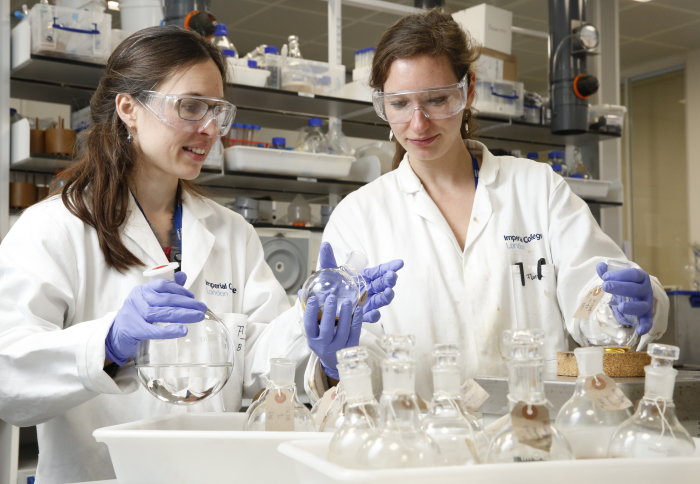Bioplastics company named in Top 10 Emerging Technologies of 2019
by Sara West

Dr Agi Brandt-Talbot and Dr Florence Gschwend of Chrysalix Technologies
Scientific American names Imperial spin-out Chrysalix Technologies a “world-changing technology”.
Each year a steering group of leading technology experts is engaged by Scientific American to identify significant emerging technologies. This year Chrysalix Technologies was named as a major disrupter in the field of bioplastics for their work on separating plant components to develop more sustainable plastics using waste materials.
Founded in 2017 by Dr Florence Gschwend and Professor Jason Hallett from the Department of Chemical Engineering, and Dr Agi Brandt-Talbot from the Department of Chemistry, Chrysalix Technologies are trailblazers in the movement to tackle society’s over-reliance on oil-derived plastic, and the resulting damage to our environment and health.
Their goal is to support sustainability and move away from a reliance on using crude oil in single-use products which are discarded at the end of their lives by enabling a “circular” bio-economy in which plastic are made from waste plant matter and can more easily be recycled and reused.
Our aim has always been to make a difference in the world and to realise impacts from our research through translation. Professor Jason Hallett Co-founder of Chrysalix and Professor in the Department of Chemical Engineering
Cellulose and lignin are key to this transformation, and the focus of the company’s work. They are found in a range of non-food plants and already used in several applications including the production of paper. Their strength and structure give plants their shape, and it’s for this reason they are useful as an alternative “plastic material”. However, the processes currently used to isolate them are expensive.
Dr Agi Brandt-Talbot explained: "Access to low cost, high quality lignin and cellulose is a key bottleneck for the sustainable biobased chemical industry, but our technology has the potential to fundamentally change this."
Chrysalix has developed a low-cost ionic liquid, which is used to separate cellulose and lignin from biomaterials such as wood, to address this issue and enable the production of bioplastics on a larger scale.
Professor Jason Hallett commented: "Our aim has always been to make a difference in the world and to realise impacts from our research through translation – this is the only way to make inroads toward defeating persistent environmental problems like plastic pollution and metal contamination. We’re very excited to be recognised by such a widely-read science magazine, and having our work highlighted to the general scientific community like this is both humbling and motivating."
Dr Florence Gschwend added: "Being named as a world-changing technology by such a prestigious science magazine is a great honour. We strive for actual benefits for all of society and spreading the word about the many potential solutions to our environmental problems to the wider public is pivotal."
You can find out more about Chrysalix Technologies on their website.
Article text (excluding photos or graphics) © Imperial College London.
Photos and graphics subject to third party copyright used with permission or © Imperial College London.
Reporter
Sara West
Communications Division